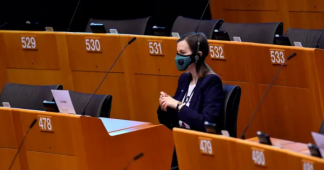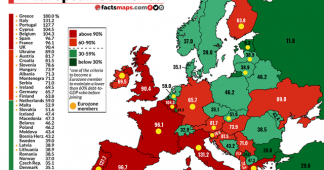The debate about the write-off of debts held by the ECB has recently gained momentum in France, but also in Italy, Luxembourg, Belgium and in the hallways of European institutions, up to representatives of the ECB itself, as well as finance ministries of the Eurozone.
This a useful and healthy debate. For the first time in a while, monetary issues have come back centre stage in the public debate. Money stops being this abstract construct withdrawn from collective deliberation and entrusted to a central bank independent from political power, yet dependent on financial markets. Citizens are discovering, some with much shock, that about 25% of the European debt is now held by their own central bank. In other words, we owe ourselves 25% of our debt and, if we are to reimburse that amount, we must find it elsewhere, either by borrowing it again to “roll the debt” instead of borrowing to invest, or by raising taxes, or by cutting expenses.
There would however be another solution. As economists, stakeholders and concerned citizens of various countries, it is our duty to point to the fact the ECB could immediately give European nations the means of their green recovery, but also heal the severe social, cultural and economic damages undergone by our societies during the devastating covid-19 health crisis.
Our argument is not that states stood pat: protective measures were indeed implemented. However, they have remained largely insufficient. The European recovery plan, based on barely 300 billion euros of subsidies over three years, is far from the 2 trillion requested by the European Parliament. Need it be reminded that before the health crisis, the European Court of Auditors already pointed to a minimum of 300 to 400 billion in additional investments every year to finance the ecological transition in Europe? This recovery plan misses the mark by a lot and even more so following the pandemic.
Yet, we do not take the cancellation of public debts – even debts held by the ECB – lightly. We are well aware that debt cancellation events are foundational moments. It was for example the case at the London Conference in 1953, when Germany benefited from a two-thirds forgiveness of its public debt, allowing it to find its way back to prosperity while firmly grounding its future inside the European Union. Thus, the real question is whether the European Union is going through such extraordinary times that would in turn call for extraordinary measures. We believe these are extraordinary times.
Fortunately, our main creditor is one that does not fear losing its money: the European Central Bank. Our solution is therefore simple: let’s make a deal between the European states and the ECB. Let her cancel the debts that she holds (or transform them into perpetual debts with 0% interest rate) and let the European states commit for the same amount to a widespread social and ecological recovery plan. These amounts currently add up to almost 2.5 trillion euros, enough to finally meet the expectations of the European Parliament and, above all, to safeguard the common good.
The ECB can without a doubt afford it. As many economists already recognize, even among those who oppose this solution, a central bank can operate with negative capital without difficulty. She can even print money to compensate for these losses: this is provided for by the Protocol 4 annexed to the Treaty on the Functioning of the European Union. Thus, in full compliance with the law and contrary to what some heads of institutions – including the ECB – claim, cancellation is not explicitly prohibited by European treaties. On the one hand, any financial institution in the world can write off its debts, and the ECB is no exception to that rule. On the other hand, the word “cancellation” does not appear neither in the treaty nor in the protocol on the European System of Central Banks (ESCB). It could perhaps be construed as “contrary to the spirit of the treaty”. But was it not also the case with the now well accepted Quantitative Easing put in place by Mario Draghi? Let us not be distracted by legal fallacies: in the end, only political will matters. And history has shown countless times that petty legal issues fade away in front of robust political deals.
Ultimately, let us be clear: it is obvious that the cancellation of public debts held by the ECB, even when conditioned on massive reinvestments, should not and cannot be the be-all and end-all of all economic policy in the Eurozone. First, the ECB would only intervene to free up fiscal leeway for governments and thus would not invest herself. The continuous reduction in the level of average public debt in the European Union between 2015, the date of the onset of negative rates, and the onset of the health crisis, shows that, contrary to expectations, weak or even negative rates are not sufficient to push states to borrow to invest. As a matter of fact, many states have deleveraged instead of borrowing to invest, despite negative rates. Why would this change now? The deal struck between the states and the ECB would prevent the states from evading their duties. But this is not merely enough: other measures should be implemented, ranging from the reform of debt and deficit criteria to green and social welfare-oriented protectionism, from tax reforms aiming to reduce levels of inequalities and change behaviours to clear impulses in the domain of public investment banks and reforms to the state aid rules. A new European governance, in particular through the transition to qualified majority voting in tax matters, must also be implemented.
The European Union can no longer afford to be systematically impeded by its own rules. Other states in the world, such as China, Japan and the USA, are using their monetary policy tool to its full extent, i.e. in support of their fiscal policy. The Bank of Japan even goes as far as to use her discretionary money-making power to buy stocks directly from the market through listed index funds (ETFs), thus becoming the country’s largest investor. We too must think about using the money-making power of the ECB to finance ecological and social reconstruction, under democratic control. The cancellation of the public debts it holds, in exchange for investments by the States, would constitute a first strong signal of the European Union’s willingness to take back control of her destiny.
Initiators
- Nicolas Dufrêne, haut fonctionnaire et directeur de l’Institut Rousseau ;
- Laurence Scialom, professeure à l’université Paris-Nanterre, EconomiX ;
- Jézabel Couppey-Soubeyran, maîtresse de conférences à l’université Paris-I-Panthéon-Sorbonne ;
- Baptiste Bridonneau, doctorant à l’université Paris-Nanterre, EconomiX ;
- Gaël Giraud, directeur de recherche au CNRS, président d’honneur de l’Institut Rousseau;
- Aurore Lalucq, économiste, cofondatrice de l’Institut Veblen ;
SIGNATORIES
France
- Adeline Baldacchino, essayiste et haute fonctionnaire ;
- Yves Besançon, économiste, professeur de sciences économiques et sociales, ancien attaché de l’Institut national de la statistique et des études économiques (Insee).
- Jérôme Blanc, professeur à sciences Po Lyon ;
- Nicolas Bouleau, professeur émérite à l’Ecole des Ponts ParisTech, spécialiste des marchés financiers ;
- Matthieu Caron, maître de conférences, université polytechnique des Hauts-de-France ;
- Michel Crinetz, commissaire-contrôleur général des assurances honoraire ;
- Véronique Danet, cadre du secteur bancaire
- Ludovic Desmedt, professeur à l’université de Bourgogne ;
- Gilles Dufrénot, professeur à l’université Aix-Marseille, chercheur associé au CEPII ;
- Denis Dupré, enseignant-chercheur à l’université Grenoble-Alpes ;
- Guillaume Duval, ancien journaliste économique ;
- Etienne Espagne, économiste ;
- Marie Fare, maîtresse de conférences à l’université Lumière Lyon 2 ;
- Jean Gadrey, économiste, ancien professeur à l’université Lille-I ;
- Ezzedine Ghlamallah, entrepreneur et chercheur en Sciences de gestion ;
- Isabelle Guérin, Institut de Recherche pour le Développement ;
- David Guilbaud, haut fonctionnaire ;
- Jean-Marie Harribey, maître de conférences à l’université Bordeaux-IV, Co Président d’Attac ;
- Luc Jacob, relations publiques monnaies et théories nouvelles ;
- Esther Jeffers, professeure à l’université de Picardie ;
- Pierre Khalfa, Fondation Copernic ;
- Ano Kuhanathan, économiste, membre du Conseil Scientifique de l’Institut Rousseau ;
- Valérie Lafargue, chargée de relation publiques pour Monnaie Dettes ;
- Thomas Lagoarde-Segot, économiste, KEDGE BS &, SDSN France ;
- Anice Lajnef, Ancien financier, entrepreneur ;
- Gaétan Le Quang, maître de conférence à l’université de Lyon 2 ;
- Caroline Lequesne Roth, maîtresse de conférences à l’université Nice Sophia Antipolis ;
- Dominique Méda, professeur à l’université Paris-Dauphine-PSL, directrice de l’Institut de recherches interdisciplinaires en sciences sociales ;
- Jacques Millery, professeur à l’EM Normandie ;
- François Morin, professeur émérite à l’université de Toulouse, ancien membre du conseil général de la BDF ;
- Olivier Passet, directeur des synthèses au groupe Xerfi ;
- Thomas Piketty, directeur d’étude à l’EHESS, professeur à l’école d’économie de Paris ;
- Dominique Plihon, professeur à l’université Sorbonne Paris Nord, membre des Economistes atterrés ;
- Jean-François Ponsot, professeur à l’université Grenoble Alpes ;
- Marc Pourroy, maître de conférences à l’université de Poitiers ;
- Christophe Revelli, professeur à Kedge Business School ;
- Catherine Samary, ancienne Maître de conférence à l’Université Paris Dauphine, membre du conseil scientifique d’Attac ;
- Patrick Saurin, syndicaliste Sud Solidaires BPCE ;
- Claude Simon, professeur émérite de l’ESCP ;
- Yamina Tadjeddine, professeure à l’université de Lorraine BETA ;
- Bruno Théret, directeur de recherche à l’Institut de recherche interdisciplinaire en socio-économie (IRIS, université Paris-IX-Dauphine) ;
- Ariane Tichit, maîtresse de conférences à l’Université d’Auvergne ;
- André Tiran, professeur à l’université Lyon 2 ;
- Jérôme Trotignon, maître de conférences à l’université Lyon 3 ;
- Christian Wandebrouck, économiste et chercheur à l’Institut Rousseau ;
- Oriane Wegner, spécialiste de régulation financière et membre de l’Institut Rousseau ;
- Jean-Claude Werrebrouck, professeur honoraire à l’université de Lille 2 ;
Italie
- Nicola Acocella, professeur émerite à l’université Roma La Sapienza ;
- Piergiorgio Ardeni, professeur à l’université de Bologna ;
- Leonardo Becchetti, professeur à l’université Rome Tor Vergata ;
- Fabio Berton, professeur à l’ université de Turin ;
- Maria Luisa Bianco, professeur à l’université degli Studi del Piemonte Orientale ;
- Ines Ciolli, professeur associé à l’université Sapienza de Rome ;
- Bruno Contini, professeur émérite à l’université de Turin ;
- Terenzio Cozzi, professeur émérite à l’université de Turin ;
- Claudio de Fiores,Università degli studi della Campania Luigi Vanvitelli ;
- Mauro Gallegati, professur à l’université politecnica delle Marche ;
- Enrico Grazzini, économiste et auteur ;
- Anna Rita Germani, économiste, professeur à l’université Roma La Sapienza ;
- Ugo Marani, professeur à l’université de Naples Federico II ;
- Edmondo Mostacci, professeur à l’université de Gênes ;
- Guido Ortona, professeur honoraire à l’université del Piemonte Orientale ;
- Riccardo Realfonzo, professeur à l’université del Sannio ;
- Fiammetta Salmoni,professeur à l’université degli Studi Guglielmo Marconi à Roma ;
- Alessandro Somma, professeur à l’université Roma La Sapienza ;
- Mario Tiberi, économiste et professeur à l’université Roma La Sapienza ;
- Antonella Tropeano, professeur à l’université de Macerata ;
- Giovanni Vaggi, professeur à l’université de Pavia ;
Allemagne
- Thomas Dürmeier, économiste, co-fondateur du réseau d’économistes Netzwerk plurale Ökonomie ;
- Joseph Huber, économiste, chair of economic and environmental sociology à l’université Martin Luther, Halle-Wittenberg ;
- Roland Kulke, économiste, conseiller pour la fondation Rosa Luxembourg ;
- Oliver Schlaudt, enseignant-chercheur au département de philosophie, université de Heidelberg ;
- Michael Tellmann, ancien membre du CA d’une banque publique de développement allemande ;
- Axel Troost, économiste, conseiller pour l’Institut d’analyse sociale de la Fondation Rosa Luxemburg ;
- Peter Wahl, membre du Conseil Scientifique d’Attac Allemagne ;
Irlande
- Ciaran MacanBhaird, professeur à la Dublin City University ;
- Brian Lucey, professeur à Trinity College, Dublin ;
- Samuel Vigne, professeur à Trinity College, Dublin ;
- Ray Walsh, director de l’European Observatory on ICT Standards (EUOS), professeur à la Dublin City University ;
Belgique
- Olivier Bonfond, économiste au CEPAG, co-président du CADTM Belgique ;
- Philippe Defeyt, économiste, président de l’Institut du Développement Durable (IDD) ;
- François Denuit, docteur en sciences politiques et sociales, collaborateur scientifique à l’Université Libre de Bruxelles ;
- Xavier Dupret, économiste, Fondation Joseph Jacquemotte ;
- Patrick Dupriez, président d’Etopia, centre de recherche en écologie politique ;
- Kim Fredericq-Evangelista, économiste ;
- Paul Magnette, professeur de sciences politiques, ancien ministre de l’énergie et du climat ;
- André Peters, sociologue de la monnaie ;
- Olivier De Schutter, rapporteur spécial à l’ONU, professor at the Institute for interdisciplinary research in legal sciences, university of Louvain (UCLouvain) ;
- Jean-François Tamellini, secrétaire général de la FGTB wallonne ;
- Eric Toussaint, docteur des universités de Liège et de Paris VIII, porte-parole du Comité pour l’Abolition des dettes illégitimes (CADTM) ;
Espagne
- Daniel Albarracín Sánchez, économiste, conseiller de la chambre des comptes d’Andalusia ;
- Juan Francisco Albert, personal investigador en formación de la Universidad de Valencia ;
- Nacho Álvarez, Economist, secretary of State for Social Rights in spanish government ;
- Iñaki Arto, Research Professor, Basque Centre for Climate Change ;
- Lorena Cabrerizo, economista ;
- Oscar Carpintero, Profesor de Economía Aplicada, Universidad de Valladolid ;
- Manuel Escudero, PhD por la LSE y Presidente del Centro de Desarrollo de la OCDE ;
- Jorge Fabra Utray, economista y Doctor en Derecho, es Presidente de Economistas Frente a la Crisis ;
- Sonia Farre, ex – diputada, experta en deuda ;
- Eladio Febrero, Profesor Titular de Teoría Económica, Universidad de Castilla-La Mancha ;
- Antonio González, Secretario General de Empleo del Gobierno de España (2006-2008) y Vicepresidente Segundo de Economistas Frente a la Crisis ;
- Carles Manera, Catedrático de la universidad de Islas Baleares, miembro de EFC ;
- Agustín José Menéndez, Universidad Complutense, Madrid ;
- José Moisés Martín Carretero, economista y consultor ;
- Cristina Monge Lasierra, politóloga y experta en gobernanza para la transición ecológica ;
- Cristina Narbona, economista, es vocal de la Junta Directiva de “Economistas Frente a la Crisis” ;
- Carlos Ochando, profesor de Política Económica, Universidad de Valencia, Director Máster en Política Económica y Economía Pública de la Universidad de Valencia ;
- Isabel M. Pajares, economista ;
- Manuel Garí Ramos, économiste, UPM Madrid ;
- Jordi Roca Jusmet, Universitat de Barcelona ;
- Fernando Rodrigo, sociólogo y miembro de la Junta Directiva de EFC y de la Fundación Transición Verde ;
- Jordi Sevilla, economista ;
- Juan Torres López, Catedrático de Economía Aplicada de la Universidad de Sevilla ;
- Jorge Uxó, Profesor Titular de Macroeconomía, Universidad de Castilla – La Mancha ;
Luxembourg
- Serge Allegrezza, économiste, haut fonctionnaire ;
- Muriel Bouchet, économiste ;
- Vincent Hein, économiste ;
- Stéphanie Ravat, CGFP et CHFEP ;
- Michel-Edouard Ruben, économiste ;
Suisse
- Christian Arnsperger, professeur à l’université de Lausanne ;
- Solène Morvant-Roux, professeure assistante à l’Université de Genève et membre du conseil scientifique de la fondation Zoein ;
- Sergio Rossi, professeur à l’université de Fribourg ;
- Pierre de Saint Phalle, professeur à l’université de Lausanne ;
- Jean Michel Servet, professeur à l’Institut des hautes études internationales et du développement ;
Suède
- Rachelle Belinga, chercheuse pour le Mistra Center for Sustainable Markets à la Stockholm School of Economics ;
Portugal
- Francisco Louça, économiste à l’université technique de Lisbonne ;
Grèce
- Costas Lapavitsas, économiste à la SOAS à Londres ;
- Nicolaos Theodossiou, professeur à l’université Aristotle of Thessaloniki, Chair of SDSN Black Sea ;
Angleterre
- Steve Keen, professeur à l’université de Kingston à Londres ;
Hongrie
- Andor Laszlo, ancien commissaire européen, économiste ;











